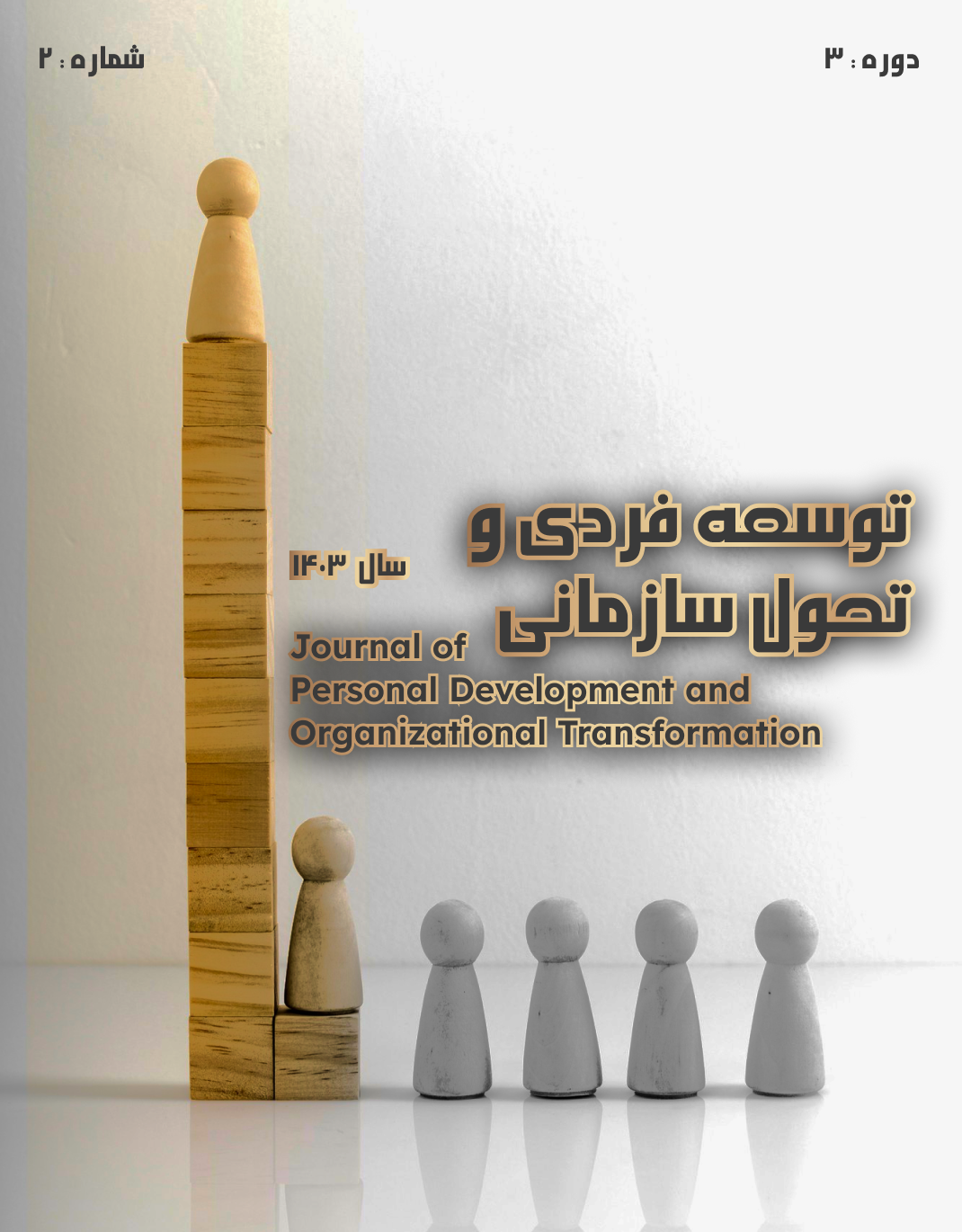Identifying the Causal Conditions Influencing Faculty Professional Growth with a Reflective Faculty Development Approach at Islamic Azad University, Sari Branch
Keywords:
Professional development, Reflective teacher, Higher education developmentAbstract
The purpose of this study was to identify the causal conditions influencing the model of faculty professional growth with a reflective faculty development approach at Islamic Azad University, Sari Branch. The research employed a mixed-methods design. In the qualitative phase, the statistical population included all academic experts and scholars who were faculty members at Islamic Azad Universities in Mazandaran Province. Based on the principle of theoretical saturation, 15 individuals were selected as the sample. In the quantitative phase, the statistical population included all full-time, part-time, and adjunct faculty members employed during the 2023–2024 academic year at Islamic Azad University, Sari Branch, totaling 540 individuals. Based on Cochran's formula, a sample size of 225 was determined using a random sampling method. Data were collected through semi-structured interviews in the qualitative phase and a researcher-made questionnaire derived from the qualitative findings in the quantitative phase. For data analysis, coding techniques were used in the qualitative phase, while SPSS version 23 and AMOS software were used in the quantitative phase. The results indicated that the causal conditions include charisma and personality traits, communication skills, effective teaching, cognitive literacy, professional ethics, and the learning environment. Among these, the most influential factor was "communication skills" with a t-value of 20.156, while the least influential was "learning environment conditions" with a t-value of 10.220. Additionally, the results of the one-sample t-test showed that all six main causal components significantly influenced the model of faculty professional growth with a reflective faculty development approach (sig = 0.000). The findings demonstrate that all these factors collectively contribute to creating a suitable learning environment in which faculty members can achieve professional growth. It can be concluded that achieving professional growth and cultivating reflective educators requires attention to all these components and conditions.
Downloads
References
Abacioglu, C. S., Fischer, A. H., & Volman, M. (2022). Professional development in multicultural education: What can we learn from the Australian context? Teaching and Teacher Education, 114, 103701. https://doi.org/10.1016/j.tate.2022.103701
Aleshinskaya, E., & Albatsha, A. (2020). A cognitive model to enhance professional competence in computer science. Procedia Computer Science, 169, 326-329. https://doi.org/10.1016/j.procs.2020.02.191
Algazlan, N., Al-jedai, A., Alamri, A., Alshehri, A. M., Aldaiji, L., & Almogbel, Y. (2022). Association between intention to leave work and quality of work-life of Saudi pharmacists. Saudi Pharmaceutical Journal, 30(2), 103-107. https://doi.org/10.1016/j.jsps.2021.12.022
Assyne, N., Ghanbari, H., & Pulkkinen, M. (2022). The essential competencies of software professionals: A unified competence framework. Information and Software Technology, 151, 107020. https://doi.org/10.1016/j.infsof.2022.107020
Aston, K. J. (2023). 'Why is this hard, to have critical thinking?'Exploring the factors affecting critical thinking with international higher education students. Active Learning in Higher Education, 14697874231168341. https://doi.org/10.1177/14697874231168341
Basantes-Andrade, A. A. U. C.-G. a. M., Casillas-Martín, S., Naranjo-Toro, M., & Benavides-Piedra, A. (2022). NANO-MOOCs to train university professors in digital competences. Heliyon, 8, e09456. https://doi.org/10.1016/j.heliyon.2022.e09456
Cavallo, A., Cosenz, F., & Noto, G. (2024). Business model scaling and growth hacking in digital entrepreneurship. Journal of Small Business Management, 62(4), 2058-2085. https://doi.org/10.1080/00472778.2023.2195463
Davis, T. R., Sydnor, J., & Daley, S. (2023). Peeking behind the curtain of teaching: Rehearsing thoughtful adaptationsJO - Teaching Education. 34(1), 113-129. https://doi.org/10.1080/10476210.2022.2042511
De Golia, S. G., Cagande, C. C., Ahn, M. S., Cullins, L. M., Walaszek, A., & Cowley, D. S. (2019). Faculty development for teaching faculty in psychiatry: where we are and what we need. Academic Psychiatry, 43(2), 184-190. https://doi.org/10.1007/s40596-018-0916-4
Eiselein, G., Saucier, D. A., & Macharaschwili, C. E. (2019). Designing, implementing, and sustaining faculty development: A model for large and diverse FYE programs. The Journal of Faculty DevelopmentVL - 33(2), 43-48. https://eric.ed.gov/?id=EJ1216765
Faqiri, M. (2023). Examination and Analysis of the Internship Program at Farhangian University: A Document-Based Study. Teacher Education Policy Studies, 6(3), 53-76. https://te-research.cfu.ac.ir/article_3648_42c402d935b382aa0cea36a97d31752d.pdf
Jabari Maraghoosh, G., Yari Haj Atalo, J., & Maleki Avarsin, S. (2022). Entrepreneurship and Growth of Faculty Members in the Light of Spiritual Leadership Mediated by Organizational Learning. Journal of Management in Organizational Education, 11(2), 187-206. https://doi.org/10.52547/meo.11.2.187
Jarchi, R., Rahnama, A., Sobhaninejad, M., & Barkhordari, R. (2024). Revisiting the Relationship Between Theory and Practice Based on the Views of Schaub and Arendt to Propose a Model for Training Thoughtful and Action-Oriented Teachers. Theory and Practice in Teacher Education, 10(17). https://tpbc.cfu.ac.ir/article_3699.html
Javadialami, L., Asadzadeh, H., Delavar, A., & Dartaj, F. (2020). Modeling the Structural Relationships of Academic Engagement and Motivation of Students Based on Transformative Teaching, Academic Self-Efficacy Mediated by Academic Vitality. Biannual Journal of Cognitive Strategies in Learning, 8(14), 1-19. https://sid.ir/paper/255138/fa
Jazini, A., & Nowai, M. (2014). Designing Dynamic Empowerment Models for Enhancing Employee Competence and Managerial Performance in the Police Force. Scientific and Promotional Journal of Supervision and Inspection, 8(27), 13-36. https://www.magiran.com/volume/98797
Liang, H. Y., Tang, F. I., Wang, T. F., & Yu, S. (2021). Evaluation of Nurse Practitioners' Professional Competence and Comparison of Assessments Using Multiple Methods: Self-Assessment, Peer Assessment, and Supervisor Assessment. Asian Nursing Research, 15(1), 30-36. https://doi.org/10.1016/j.anr.2020.10.004
Tanha, H., Fathi Varnoosfaderani, L., & Ahqar, Q. (2021). Providing a Model of Professional Competence and Its Impact on Spiritual Vitality. Journal of Islamic Lifestyle with a Focus on Health, 5(3), 354-364. https://sid.ir/paper/985620/en
Valadi Alashti, H., Khateir Pasha, K., & Taghavi Yazdi, M. (2021). Identifying the Role of Farhangian University in Training Thoughtful Teachers with a Knowledge-Based Approach for Model Development. Journal of Jundishapur Education Development, 12(Special Issue), 361-374. https://edj.ajums.ac.ir/article_139427.html
Downloads
Published
Submitted
Revised
Accepted
Issue
Section
License
Copyright (c) 2025 سارا علیپور رعیت , سیده لیلا حسینی طبقدهی, مجتبی رضایی راد, کامبیز اسمعیل نیا شیروانی (نویسنده)

This work is licensed under a Creative Commons Attribution-NonCommercial 4.0 International License.







